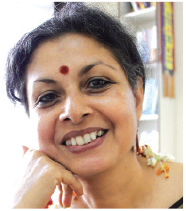- Home
- Archive -Mar 2020
- Its time for th. . .

Its time for thrift
- In :
- March Spirit
It’s time for thrift
Suma Varughese suggests a return to thrift to combat the climate crisis
It’s official. We are now living through a climate crisis. And we cannot afford to look away any more.
My guess is that each of us will respond in ways that come naturally to us. Some will go vegan. Some will go organic. Some will plant more trees. Some will fight pollution. As for me, I’m going with thrift.
It’s an old-fashioned word but it represents a value that is timeless in our country, and it has the power to counteract the crisis. Because thrift means to use resources carefully and judiciously, and to waste nothing.
The other day, I was washing my hair and found that my shampoo had run out. I poured some hot water into the bottle and hey, I had enough shampoo not just for that day but for my next hair wash too! I also squeeze out every bit of toothpaste before I confine it to the dustbin. I live simply. I do not favour excess. You will rarely find me buying more than one of anything. My kitchenware is sparse and contains only what I need. I do not overstock towels or bed linen. I use only one watch, one handbag, one mobile, and one pair of shoes at any given time.
When I shop at the grocer’s or even at the mall, I buy only what I need. My shopping bag will rarely bulge with great deals. I do not use makeup, save for powder bindi and kajal. I rarely eat out. I possess little or no jewellery. I do not own a vehicle. I own one modest one-bedroom flat in a suburb of Mumbai.
This was standard practice for most people of my parents’ generation, who were the embodiments of thrift. Nothing was wasted. Ever. Old saris were used for rags or sanitary napkins, or were recreated into quilts or soft paddings to wrap around babies. Rice was washed so vigilantly that not even a grain would be wasted. My mother would often tell me that the mothers-in-law in her time would warn their daughters-in-law that there was only one lucky grain of rice in the meal’s portion and it could not be lost.
In Kerala (where I come from) food would be cooked from fuel gathered from the fields and garden, which also provided the vegetables. My parents lived in the backwaters, so all they needed to fish was to go down to the river that ran at the bottom of their homestead, put some rice grains into a fishing rod, and catch enough for a tasty dinner. Vessels would be scrubbed with the ash left over from the fuel used for cooking or with mud. Being a rice-growing state, the husks of rice grains would be burnt to provide crunchy black dust to brush teeth with.
Most people had kanji at night (rice served with the water it is cooked in), leavened with some buttermilk, coconut chutney, or mung beans. The kanji would be scooped up with leaves of the jackfruit tree, stitched into a cup. I remember in our early days in Bangalore, we had an old-fashioned iron into whose innards you slipped burning coconut shells. We would starch our clothes with the water left over from draining the cooked rice.
Organic. That’s how we led our lives. And that is the great hope for our future. If our parents trained us in thrift, they, in turn, were inspired by the timeless self-sustaining cycles of Mother Earth. Nothing goes to waste on Planet Earth. All life returns to the earth and becomes soil, which, in turn, becomes the womb for fresh life. Water is condensed into vapour by the sun, which is then returned to us as life-giving rain. The seeds of the fruits and vegetables grow the next round of harvest.
If we were to abide by the profound wisdom of Nature, we can still save the day. Don’t you think so?
To read more such articles on personal growth, inspirations and positivity, subscribe to our digital magazine at subscribe here
Life Positive follows a stringent review publishing mechanism. Every review received undergoes -
- 1. A mobile number and email ID verification check
- 2. Analysis by our seeker happiness team to double check for authenticity
- 3. Cross-checking, if required, by speaking to the seeker posting the review
Only after we're satisfied about the authenticity of a review is it allowed to go live on our website
Our award winning customer care team is available from 9 a.m to 9 p.m everyday
The Life Positive seal of trust implies:-
-
Standards guarantee:
All our healers and therapists undergo training and/or certification from authorized bodies before becoming professionals. They have a minimum professional experience of one year
-
Genuineness guarantee:
All our healers and therapists are genuinely passionate about doing service. They do their very best to help seekers (patients) live better lives.
-
Payment security:
All payments made to our healers are secure up to the point wherein if any session is paid for, it will be honoured dutifully and delivered promptly
-
Anonymity guarantee:
Every seekers (patients) details will always remain 100% confidential and will never be disclosed
